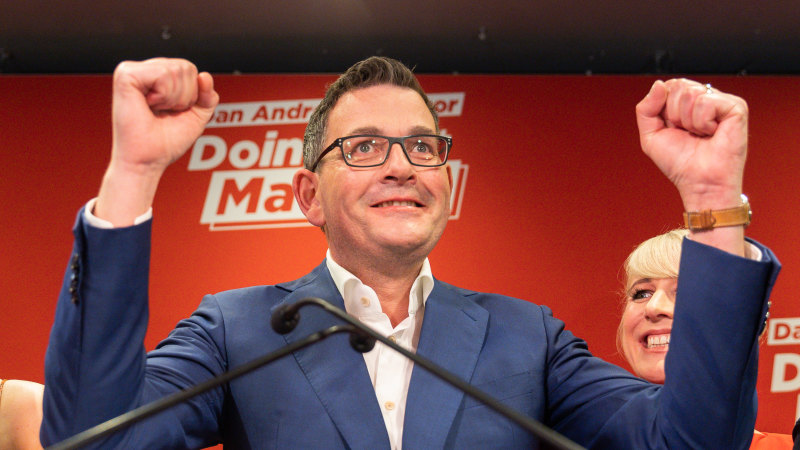Save articles for later
Add articles to your saved list and come back to them any time.
Victoria’s political donation laws need to be further overhauled to remove advantages for Labor and the Coalition, say leading integrity experts who warn money cannot be allowed to drown out ideas in the campaign spending arms race.
The Centre for Public Integrity, a non-partisan think tank, said in a submission to a review of the Andrews government’s 2018 donations reforms that current rules around political money risk “entrenching incumbency” and may be having an adverse impact on “political equality”.
Premier Daniel Andrews.Credit: Getty Images
The centre’s submission, released exclusively to The Age, welcomed Labor’s “improvements” including a donation cap of $4000 (now $4320) over four years. But it said campaign spending caps were needed to “encourage elected members to represent their constituencies’ interests … rather than focus on raising campaign funds”.
Victoria’s dollar-per-vote public funding system is meant to reduce the risk of corruption. But the centre’s research director, Catherine Williams, said that without electoral expenditure caps, public funding would not dampen demand for private money to fund increasingly expensive campaigns.
“Appropriately designed expenditure caps will ensure that dollars cannot speak louder than ideas in Victoria, and our political aspirants are truly competing on a level playing field,” she said. Victoria and Western Australia are now the only states without electoral spending caps.
Analysis by the Centre for Public Integrity shows that when the other states introduced caps – including NSW in 2010 and Queensland in 2011 – there was a notable decline in campaign spending.
Other experts including University of Sydney constitutional law professor Anne Twomey also support spending caps and warn that without them, politicians are tempted to do deals to raise funds.
“If donation caps reduce the size of donations, but expenditure is unlimited, it creates an environment that encourages corruption and the avoidance of legal constraints to maintain high levels of expenditure,” Twomey said in her submission to the donations review.
Monash University associate professor Dr Yee-Fui Ng also backed spending caps to “level the playing field between political parties, by removing the ability of parties to mount expensive electoral campaigns”.
After years of controversy around political money in Victoria, the Andrews government amended the Electoral Act in 2018, spruiking the reworked rules as the “strictest and most transparent political donation laws in Australia”, including a cap on donations and compulsory disclosure of all donations over $1000.
Matthew Guy, with wife Renae, conceding defeat on election night in November.Credit: Jason South
But weaknesses remained, including loopholes that allow the major parties to continue harnessing big union and corporate funds.
Although the Coalition did not formally back the reforms in 2018, its opposition was muted after exemptions were included allowing a registered political party to appoint a “nominated entity” that can receive uncapped donations.
The move allowed Liberals to continue to receive funds from the investment vehicle, the Cormack Foundation. The Nationals have Pilliwinks Pty Ltd; while the ALP has Labor Services and Holdings.
The nominated entity option is not available to independents, and to date only the major parties have bothered registering such an entity, suggesting that minor parties do not see them as beneficial.
The Centre for Public Integrity’s submission calls for the abolition of the nominated entity exemption, noting it operates to the exclusive benefit of Victoria’s “legacy parties”.
It also says the current exemption for fees from “associated entities” – such as trade unions – which are widely seen to benefit the Labor Party, should only apply up to a threshold of $2000 per member of the affiliated organisation.
Nor, currently, are subscription or membership fees captured under the definition of donation, allowing political players to funnel unlimited funds to their party of choice.
The centre says the answer is to allow subscription fees up to a designated threshold – noting that such thresholds exist in the ACT ($250) and NSW ($2000).
Experts are also calling more speedy public disclosure of donations. Queensland’s electoral rules require disclosure within seven days, but “real-time” disclosure in Victoria is 21 days.
The review of the donations regime was required as part of the 2018 amendments to the Electoral Act. The three-person panel overseeing the review must submit its report by 24 November.
Get the day’s breaking news, entertainment ideas and a long read to enjoy. Sign up to receive our Evening Edition newsletter here.
Most Viewed in National
From our partners
Source: Read Full Article



